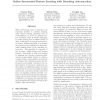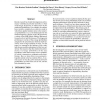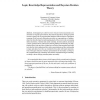164
Voted
JMLR
2012
13 years 4 months ago
2012
While determining model complexity is an important problem in machine learning, many feature learning algorithms rely on cross-validation to choose an optimal number of features, ...
111
Voted
UAI
1990
15 years 3 months ago
1990
The intelligent reformulation or restructuring of a belief network can greatly increase the efficiency of inference. However, time expended for reformulation is not available for ...
117
Voted
UAI
1996
15 years 3 months ago
1996
Developing a large belief network, like any large system, requires systems engineering to manage the design and construction process. We propose that network engineering follow a ...
133
click to vote
UAI
1996
15 years 3 months ago
1996
Inference algorithms for arbitrary belief networks are impractical for large, complex belief networks. Inference algorithms for specialized classes of belief networks have been sh...
106
Voted
UAI
1996
15 years 3 months ago
1996
Recent research has found that diagnostic performance with Bayesian belief networks is often surprisingly insensitive to imprecision in the numerical probabilities. For example, t...
101
Voted
FLAIRS
1998
15 years 3 months ago
1998
The increasing number of knowledge-based systems that build on a Bayesian belief network or influence diagram acknowledge the usefulness of these frameworks for addressing complex...
125
Voted
UAI
2003
15 years 3 months ago
2003
In non-ergodic belief networks the posterior belief of many queries given evidence may become zero. The paper shows that when belief propagation is applied iteratively over arbitr...
103
Voted
UAI
2004
15 years 3 months ago
2004
The paper introduces mixed networks, a new framework for expressing and reasoning with probabilistic and deterministic information. The framework combines belief networks with con...
110
Voted
MMNS
2001
15 years 3 months ago
2001
Abstract. In this paper, we present a framework for supporting intelligent fault and performance management for communication networks. Belief networks are taken as the basis for k...
125
Voted
CL
2000
Springer
15 years 6 months ago
2000
Springer
In this paper I give a brief overview of recent work on uncertainty inAI, and relate it to logical representations. Bayesian decision theory and logic are both normative frameworks...



